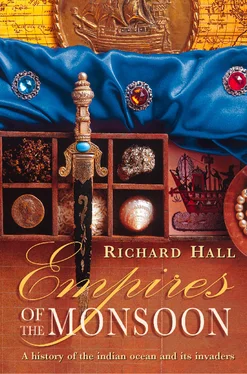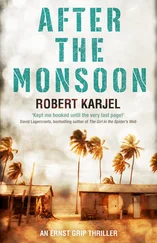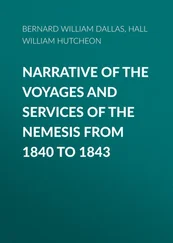Moreover, notions about the shape or size of countries, even ones close at hand, were vague and confused. Map-making had scant regard for scale, journeys were measured by the time they took rather than the distance covered, and the whole subject was bedevilled by those theological theories about the world having a flat, plate-like shape, with Jerusalem at its centre.
As for the inhabitants of distant lands, any fantasy was believable. Europe’s appetite for the grotesque was sustained by the inclusion in many medieval writings of excerpts from the work of Caius Julius Solinus, who in late Roman times had plagiarized Pliny’s Natural History , assembled many ancient myths about human and animal monsters, then spiced them all up with his own imaginings. Another proponent of the fantastic was Osorius, a fifth-century priest in Spain whose main purpose in his ‘world encyclopaedia’ was to vilify all non-Christians. Through such works, much of Asia, and all of Africa, became peopled with ‘troglodytes’, who lived underground and ‘jibbered like bats’ in an unknown tongue. There were also half-human creatures looking like hyenas, men with four eyes, and others with only half a head, one arm, and one leg upon which they could jump to astounding heights.
All these improbabilities went unchallenged in Europe because there were virtually no eye-witness accounts of the world beyond Egypt and Palestine. Although many Arabic works, such as medical textbooks, had already been translated into Hebrew or Latin, the Arab geographers seem to have been largely ignored. The only non-Muslims able to travel with little hindrance across the boundaries of the two dominant religions were certain Jewish merchants, whose trading networks stretched out to the East from Alexandria and the cities of the Levant. Yet they were intensely secretive about where they went and what they had seen.
One rare exception was a rabbi named Benjamin of Tudela. 1In the twelfth century he spent twelve years travelling from northern Spain to Baghdad, Basra, the cities of Persia and parts of India. Benjamin writes about Christians with bitterness, but is conspicuously warm towards Muslims: the caliph of Baghdad is called ‘an excellent man, trustworthy and kind-hearted towards everyone’, as well as ‘extremely friendly towards the Jews’. The rabbi’s principal aim was to compile a register of the Jewish communities in as many cities of Asia as he could reach (the results were gratifying to him, because he found them to be numerous and prospering everywhere).
He gives a vivid impression of life in Persia, then goes on to explain in detail how merchants arriving in the great South Indian port of Quilon were assured of security by the ruler. His narrative also describes the growing and processing of pepper and other spices in the countryside round Quilon. Although the rabbi did not go as far as Ceylon, which he called Kandy (after one of the kingdoms on the island), he established that even it had 23,000 Jewish settlers. He added: ‘From thence the passage to China takes 40 days.’ It is the earliest known use of this name by a medieval European writer to identify the greatest power of the Orient. Benjamin wrote a level-headed narrative, and monsters have no place in it, apart from the ubiquitous rukh , which he claims swoops down on sailors shipwrecked on the way to China, then flies away with them in its claws to eat them at leisure; some sailors had been clever enough, after being deposited on dry land by the bird, to stab it to death.
On his way home Benjamin took ship across the Indian Ocean to Yemen. There he collected some hearsay information about the source of the Nile, ‘which comes down here from the country of the blacks’. The yearly rise in the level of the river was caused by floods from Abyssinia, also known as Ethiopia:
This country is governed by a king, whom they call Sultan al-Habash, and some of the inhabitants resemble beasts in every way. They eat the herbs which grow on the banks of the Nile, go naked in the fields, and have no notions like other men; for instance, they cohabit with their own sisters and with anybody they may find. The country is excessively hot; and when the people of Aswan invade their country they carry wheat, raisins and figs, which they throw out like bait, thereby alluring the natives. They are made captive, and sold in Egypt and the adjoining countries, where they are known as black slaves, being the descendants of Ham. 2
In the terminology of his time, Rabbi Benjamin spoke of Ethiopia as belonging to ‘Middle India’, which extended up to the east bank of the Nile, with Africa starting only on the west bank. The shape and size of India, suspended from the great bulk of Asia, was still a mystery, but the term itself was liberally applied to lands bounding the ocean which took its name. ‘Greater India’ was the south of the sub-continent and lands further east. ‘Lesser India’ lay to the north. ‘Middle India’ included the southern parts of Arabia as well as Ethiopia – a name with Greek origins. ‘India Tertia’ covered East Africa, as far as its existence was known, and sometimes Ethiopia as well, which was imagined to be in the southern hemisphere.
In the century following the travels of Rabbi Benjamin, merchants in Europe had begun to ponder ways of finding some unimpeded route to the wealth of the East. After the defeats inflicted on the crusaders by the armies of Saladin, the great Kurdish leader, all access to the Red Sea was strictly denied to Christian traders. Goods from India and China could be bought from Arab merchants in Alexandria and other ports of the eastern Mediterranean, but prices were high and payment must always be in gold. Moreover, this business was dominated by Venetians, whose Adriatic republic felt strong enough to flout the papal prohibitions about trading with Islam.
So in the spring of 1291, a small flotilla of ships left Genoa, the leading rival of Venice, and headed westwards through the Mediterranean. They were captained by two brothers, Ugolini and Vadino Vivaldi, men with a bold scheme in mind. They intended to sail through the Strait of Gibraltar, follow a southerly course down the coast of Africa, and keep on until they made a landfall at last upon the shores of India or Persia. Considering the meagre geographical knowledge in the Europe of their time, this plan could only have been based upon intuition and reckless courage. Nevertheless, the purpose was practical enough: if they could open such a route, they might break the Venetian stranglehold.
A few Genoese were already living in Persia, which had been conquered seventy years before by the Mongols under Chinghiz Khan. Although these compatriots were on friendly terms with a king named Arghon, who ruled the vast western empire of the Mongols, there was as yet no unimpeded way of sending home merchandise.
The Vivaldis sailed past Gibraltar, and were seen heading south along the Moroccan coast. After that, they were never heard of again. Their frail vessels, propelled by oarsmen and sails rigged for Mediterranean weather, were no match for the Atlantic currents and storms. The doomed Genoese could never have guessed at the African continent’s immense length and the perils to be faced in trying to circumnavigate it.
The Vivaldi brothers were two centuries ahead of their time. For many years after their disappearance, members of their family sought in vain for news of them. There were even rumours, but never any proof, that they had managed to sail round Africa, only to be wrecked at the mouth of the Red Sea.
The much-discussed disappearance of the Vivaldis would have been of more than passing interest to a prosperous Venetian merchant brought to Genoa a few years later, in 1296, and put under guard in a castle overlooking the harbour. His name was Marco Polo, and he had been taken prisoner during a sea battle in the Adriatic, just after returning to Europe from twenty years in the East.
Читать дальше












